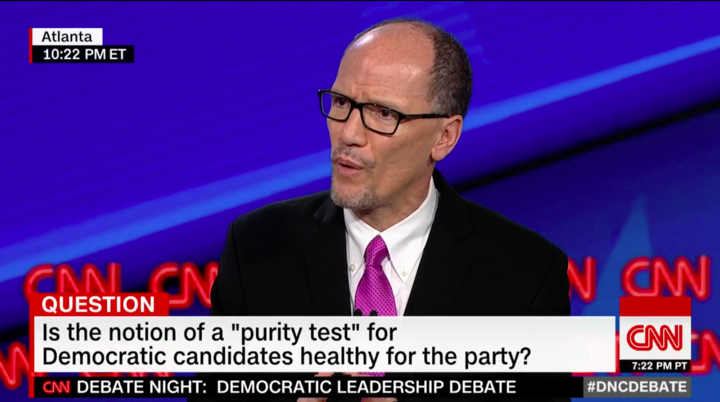DNC chair candidates spar on future of party as race tightens
The two most prominent candidates to lead the Democratic Party appeared to agree with each other on most of the issues in a CNN debate Wednesday night, while outsider candidates and the moderators needled them about how sharply the party should focus on President Donald Trump and whether sitting Democratic officeholders should be primaried in 2018.
The two frontrunners for the race, former Labor Secretary Tom Perez and Rep. Keith Ellison of Minnesota, both vowed to remain neutral if sitting Democrats are challenged by more liberal candidates in 2018 and also stuck closely to a message of economic empowerment aimed at making Democrats more appealing to “working people.”
Though the race between Perez and Ellison has been portrayed as a proxy war between the establishment and progressive wings of the struggling party, both men sounded remarkably similar notes during Wednesday’s debate — insisting that Democrats primarily need an economic message and that the DNC must build a reputation for fairness and transparency to win elections going forward.
Perez said he would “let the process run its course” if sitting Democrats are challenged in 2018 by candidates to their left, while Ellison said he would remain “neutral.”
But underdog candidate Jaime Harrison, the South Carolina state chair, sharply disagreed. “If Democrats want to be in a permanent minority let’s spend all of our time fighting each other,” Harrison said, garnering applause from the audience of DNC members. “We have to fight against Republicans, we can’t fight each other.”
Harrison dropped out of the race the following day and endorsed Perez:
BREAKING: @harrisonjaime out of DNC race, backs @TomPerez . Story to come.
— Ben Kamisar (@bkamisar) February 23, 2017
Perez, who has been endorsed by former Vice President Joe Biden, currently holds a slight lead over Ellison, who is backed by Sen. Bernie Sanders, according to an Associated Press survey of DNC members conducted before Harrison exited the race. Harrison came in third, trailed by two other outsider candidates — South Bend, Ind., Mayor Pete Buttigieg and Idaho party leader Sally Boynton Brown. The vote will be Saturday morning in Atlanta.

Perez and Ellison played defense for much of the debate, with the former labor secretary at one point pushing back on a question from the moderator that he felt was implying he was not liberal enough. “I think implicit in that question is, ‘Tom’s not a progressive,” Perez said when asked by CNN’s Dana Bash how he could be the right messenger for working class voters given his past support for the Trans Pacific Partnership trade deal. “TPP is dead,” Perez said. “It’s been dead since last August or September. So the issue is how are we going to move forward.”
Ellison, meanwhile, was asked to defend comments he made that were critical of Israel and past charges of anti-Semitism, as well as a remark in 2014 on Bill Maher’s show that suggested he opposed the Second Amendment. He called the anti-Semitism allegations “false” and pointed out that he’s voted for billions of dollars in U.S. aid to Israel. “I believe that the U.S.-Israel relationship is special and important and I’ve stood for that principle,” Ellison said. The Congressman also said the Second Amendment comment was taken “out of context” and that while he supports stricter background checks for buying firearms, he has hunted turkeys and still goes hunting with a friend.
At that point, Buttigieg, an openly gay Navy Reserve officer, interjected. “I spent Thanksgiving morning in a deer blind with my boyfriend’s father,” he said. “How’s that for a 2017 sentence?”
Buttigieg complained that comments like Ellison’s on the Second Amendment are why Americans “tune out” Democratic politicians.
The debate also revealed some disagreement about how focused the party should be on President Trump going forward.
Perez said it was important to “take the fight” directly to the president, while Ellison said the DNC has a “special role to play” in opposing Trump.
But Buttigieg said he thinks the president has become like a “computer virus” that “ties up” people’s minds and could distract Democrats. “Yes, we’ve got to take the fight to him, but we can’t let him dominate our imagination,” he said.

Harrison criticized former President Barack Obama for draining resources from the local state parties in favor of Organizing for America, his campaign vehicle. Harrison said when Obama was sworn in, the Democrats controlled most governorships, the White House, the Senate and the House, before the DNC was saddled with Obama’s campaign debt and investment in local parties dropped.
“State parties in this country are broken,” Harrison said to applause. “You can’t win if you don’t have the capacity.”
All the candidates called for greater investment in local parties to prevent another election like 2016.
“You can’t show up at a church every fourth October and call it an organizing strategy,” Perez said.
Though Perez has the lead in the AP’s delegate count, the race is fluid, and some delegates remain undecided.


